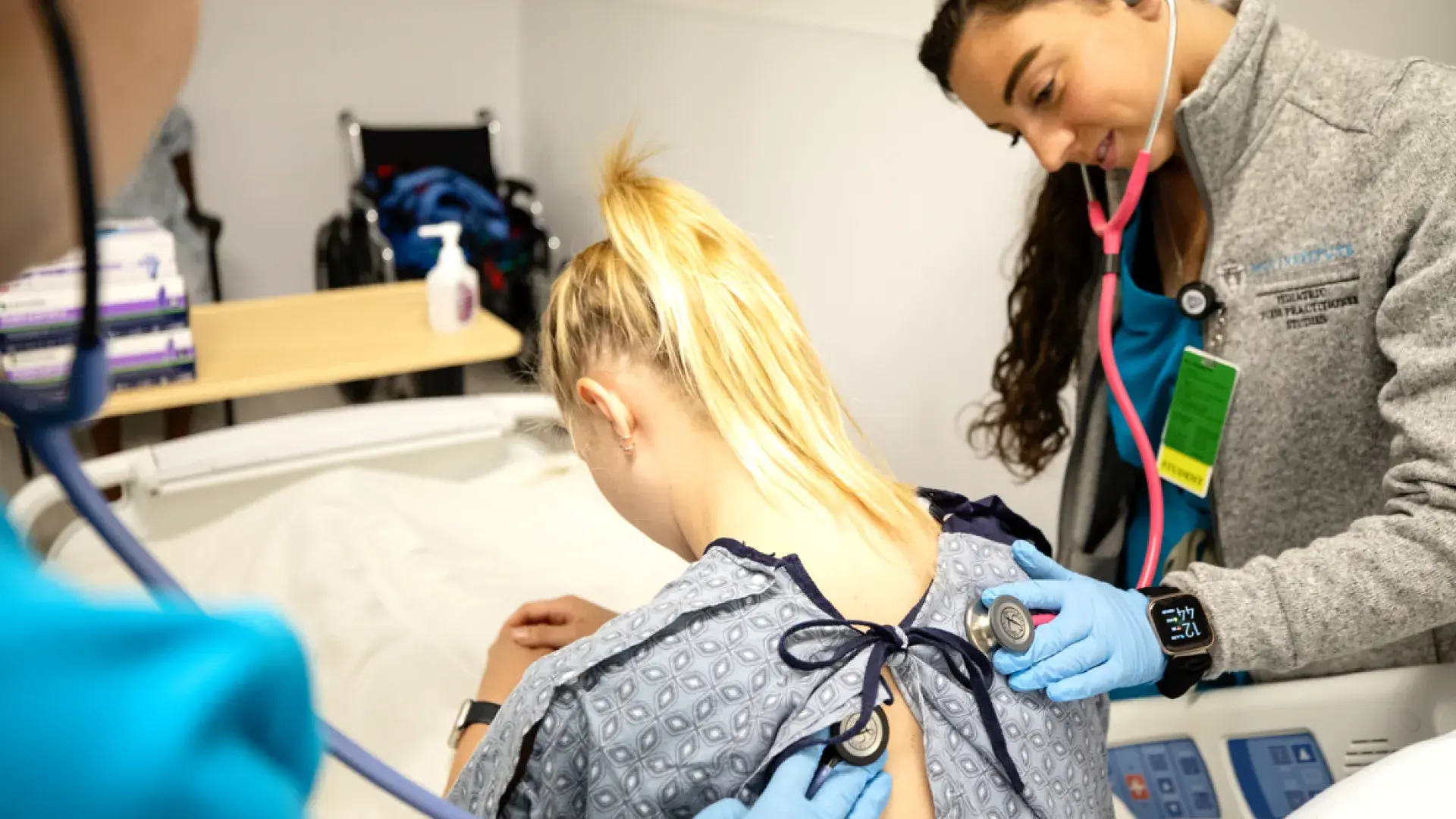
The IHP School of Nursing utilizes a framework developed by the American Association of Colleges of Nursing (AACN) that provides guidance for the development and revision of nursing curricula for all types of nursing degrees. Called The Essentials, the document identifies 10 domains that represent the essence of professional nursing practice and the expected competencies for each domain. All IHP School of Nursing end of program student learning outcomes and course objectives are designed to meet the AACN Essentials.
| Domain | Pre-Licensure | Master's | DNP |
|---|---|---|---|
| 1. Knowledge for Nursing Practice | Applies knowledge from the liberal arts and sciences to solve complex problems related to individual and population-based health care. | Integrates nursing, organizational, and learning theories, and related sciences, to improve health outcomes with diverse populations at all levels of care. | Integrates science from nursing and other disciplines with knowledge from ethics, the biophysical, psychosocial, analytical, and organizational sciences to improve health outcomes for diverse populations, at the highest level of nursing practice. |
| 2. Person Centered Care | Through outreach and collaboration, promotes health and illness/injury prevention, including health consequences of climate change, to diverse populations across the lifespan using a culturally inclusive approach. | Designs patient-centered and culturally inclusive strategies to guide nursing practice and optimize health outcomes,, including health consequences of climate change, for a diverse society. | Conducts and analyzes comprehensive and focused patient-centered physical, behavioral, psychological, spiritual, socioeconomic, and environmental assessments, including health consequences of climate change, across the lifespan and health care continuum in the delivery of culturally inclusive care to individuals and populations. |
3. Population Health | Integrates foundational knowledge of healthcare policy to advocate for health equity for all communities. | Advocates for and contributes to policies that improve health equity, recognize humanity, drive innovation, and respect dignity for all people and communities. | Develops and critically analyzes health policy proposals, health policies, and related issues from the perspective of consumers, nursing, other health professions, and policy stakeholders to foster health equity for all communities. |
| 4. Scholarship for Nursing Discipline | Demonstrates an understanding of the research process and applies sound evidence to support clinical practice. | Integrates theory, research, evidence, clinical judgment, and interprofessional perspectives in clinical and educational practice. | Uses analytic methods to critically appraise existing literature and other evidence to evaluate and create change towards health care outcomes. |
5. Quality and Safety | Recognizes safety and quality concerns and implements strategies to create a safe environment for care delivery. | Integrates safety and quality initiatives in designing systems to improve health outcomes. | Employs the principles of improvement science to achieve desired outcomes while promoting a culture of accountability, safety, and transparency. |
| 6. Interprofessional Partnerships | Confidently and skillfully communicates with members of the interprofessional team to achieve shared goals and improved patient and community outcomes. | Promotes effective teamwork and intra- inter-collaboration to provide inclusive and equitable educational and clinical practice. | Fosters collaboration and respect between and among disciplines to facilitate shared accountability and optimize care and strengthen outcomes. |
7. Systems Based Practice | Identifies the larger system of health care and system resources to provide safe, effective, timely and equitable health care to individuals and diverse populations, while considering cost effectiveness. | Participates in system-wide initiatives that improve clinical and educational outcomes, enhance value, quality, and cost-effectiveness, and promote justice, equity, and inclusivity to individuals and diverse populations. | Leads in complex systems of health care to effectively and proactively coordinate resources to provide safe, effective, patient-centered, timely, efficient, and equitable care to diverse populations. |
| 8. Informatics and Healthcare Technologies | Utilizes information technologies in the delivery of safe and effective care and to evaluate and improve practice. | Utilizes informatics and other technologies in designing and delivering effective strategies that optimize health and educational outcomes. | Demonstrates the conceptual ability and technical skills to develop and execute an evaluation plan involving data extraction, selection, and use of data from educational and practice information systems and databases. |
| 9. Professionalism | Promotes social and racial justice, equity, diversity, inclusion/belonging, and the protection of human rights in delivering high quality care to individuals and populations. | Embodies compassion, respect, and a professional commitment to promote, advocate for, and protect human rights, health and safety. | Conducts and analyzes comprehensive and focused patient-centered physical, behavioral, psychological, spiritual, socioeconomic, and environmental assessments, including health consequences of climate change, across the lifespan and health care continuum in the delivery of culturally inclusive care to individuals and populations. |
| 10. Personal, Professional and Leadership Development | Employs culturally inclusive and equitable leadership skills in critical decision-making, effective communication, and collaboration within and among teams, and in delegation and conflict resolution. | Utilizes leadership skills, change theories, and effective decision making in advanced nursing roles in the provision of culturally inclusive, equitable, high-quality education and health care. | Leads using organizational and systems approaches to create change in culturally inclusive, equitable, and complex educational and healthcare systems. |
